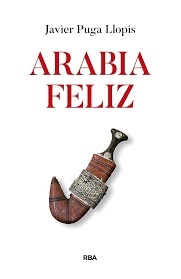
Original Language: castellano
Year of publication: 2023
Valoración: Disappointing
Right now it is possible that a percentage of citizens of the usual is able to place Yemen on the map, thanks to the fact that some attacks have been released to ships that sail through the Bab el-Mandeb Strait and missile missiles that travel two thousand kilometers north. Because otherwise it is a virtually unknown country outside the Arab world, a territory in which a very small handful of allergic travelers to conventional tourism are barely entered. From what this book tells, the Romans called him Arabia felixand that lyrical (and who knows if descriptive) denomination is what serves as a title.
Javier Puga Llopis is a diplomat who with thirty years is destined for the Spanish embassy in that country, and offers a story of experience: interesting, a more or less inexperienced young man sent to an exotic place, also in the turbulent times of the Arab springs. On the political seizure of that period (remember, Tunisia, Libya, Egypt, then Syria) extends the author quite a lot, as well as on collateral and more personal issues, so that the book does not have a clear chronological development or seems to pretend a very defined or systematic analysis of the country, its people, its landscapes, its social reality. Let’s say it is a hybrid that takes foot in the situation and from there it flies free. Well, if that were everything we would be talking about a discreet book, which without provoking enthusiasm does not cease to have a certain interest. But there are other problems.
Apparently no one has told Javier Puga that in a book the ornaments, of the type, have to be very measured and, in case of doubt, it is better to do without them than to overload the text with cultisms, subtle irony, quotes, metaphors and, above all, foreigners. That we already assume that the officials of the external service of the State will handle with ease a few languages, but it is not necessary to place on each page several words in French (already, the language of diplomacy), English and, given the context, of course Arabic. And why not, a few Latinas here and there that contribute a lot of aura. Nor is it advisable, it seems to me, abusing lyricism or looking for each word its elegant synonym and its ingenious version (searched) to dazzle is not known who.
If all this occurs in a book that is not fiction, the thing worsens further, and that overall prose of tropes and erudition exhibitions becomes something pretentious and pedantic that does not need many pages to pack the reader. Unfortunately is what happens with Happy Arabia Because, even admitting that it is a book that wants to overwhelm the literary genre corsets (trip-autobiography test), the license I understand can be granted to the author to handle resources cannot be unlimited, and in this case it completely overflows the admissible, even bearable.
Source: https://unlibroaldia.blogspot.com/2025/08/javier-puga-llopis-arabia-feliz.html


